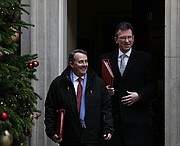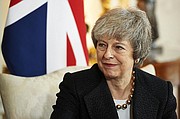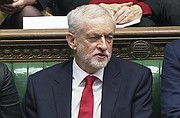BERLIN -- The head of the European Union's executive branch is urging Britain to "get your act together" and decide what exactly the country wants as its departure from the EU looms.
Britain is due to leave the EU on March 29, but its Parliament hasn't approved the government's EU-divorce deal, which many lawmakers loathe. A vote is scheduled in mid-January.
European Commission President Jean-Claude Juncker said in Sunday's edition of Germany's Welt am Sonntag newspaper that it is "entirely unreasonable for parts of the British public to believe that it is for the EU alone to propose a solution for all future British problems."
He added: "My appeal is this: Get your act together and then tell us what it is you want. Our proposed solutions have been on the table for months."
Separately, British International Trade Secretary Liam Fox said Sunday that the chances of the U.K. leaving the EU are "50-50" if Parliament rejects Prime Minister Theresa May's withdrawal agreement next month.
"If we were not to vote for that, I'm not sure I would give it much more than 50-50," Fox told the Sunday Times. "For me, that would induce a sense that we had betrayed the people that voted in the referendum."
Fox told his fellow lawmakers that it was a "matter of honor" to back May and that he'd rather accept an agreement that falls short of the ideal than risk a failed departure.
"For me, the worst possible outcome of this process would be no Brexit," he said in the interview.
The vote on the departure deal is set for the week of Jan. 14, May has said, without giving a precise date. The premier pulled a vote on the deal scheduled for earlier this month, acknowledging she did not have the support to win approval.
May has sought additional reassurances from the EU that might win the support of her own rebellious Conservative Party lawmakers and her allies in Northern Ireland's Democratic Unionist Party, which provides the votes to give her a majority in the House of Commons.
Fox said he would like to see more EU concessions on the so-called Irish backstop, language in the deal meant to avoid the creation of a hard border between Ireland, which remains in the bloc, and Northern Ireland.
Juncker suggested to Welt am Sonntag that the U.K. and EU should "start the following day to prepare the future relations" should Parliament approve the exit deal in January.
"I get the impression that the majority of British members of Parliament deeply mistrust Mrs. May and the EU," Juncker said. "People imply that our goal is to keep the U.K. in the EU by any means. But that's not our intention. We just want clarity on the future relations. And we respect the result of the referendum."
U.K. Labor Party leader Jeremy Corbyn has ruled out backing a second referendum on leaving the EU, and he said the House of Commons should proceed with the vote on May's withdrawal deal. He also said that even if his party won a snap general election in 2019, he would go to Brussels and try to secure a better deal, if possible, in time to allow the exit to proceed on March 29.
"I think we should vote down this deal; we should then go back to the EU with a discussion about a customs union," Corbyn told the Guardian in an interview published Dec. 22.
Ahead of next month's vote, the government has stepped up preparations for a no-deal withdrawal, including asking pharmaceutical companies and supermarkets to stockpile drugs and food, putting 3,500 troops on standby and hiring ferries to carry trucks across the English Channel to avoid potential snarls.
Although lawmakers return to Parliament on Jan. 7, Stephen Barclay, the secretary of state for exiting the European Union, will lead a meeting of ministers earlier in the new year in order to plan for the EU departure, according to a government official.
Separately, economists in an annual survey by the Times expressed a belief that exiting the EU without a deal would trigger a cut in taxes and interest rates and the return of quantitative easing.
All 52 economists polled, including four prominent EU-exit supporters, agreed that a disorderly exit would require intervention from the Treasury and the Bank of England that would leave the nation with a larger deficit.
Information for this article was contributed by staff members of The Associated Press; and by Bill Haubert and Bill Lehane of Bloomberg News.
A Section on 12/31/2018


